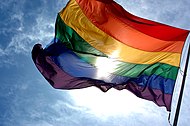 About two weeks ago, I attended the annual SECSOR
(Southeastern Conference for the Study of Religion) conference in Atlanta, GA.
As I waited to present my paper, I listened to an individual present on
the difficulties for LGBT (Lesbian, Gay, Bi-sexual, and Transgender) advocates
in reading Lev. 18:22 and 20:13. To sum up the argument presented, these passages are
descriptive of a specific action and prohibition, and because these passages
are restricted by their socio-historical context and fail to resonate with a
contemporary understanding of homosexuality, these prohibitions are not immediately applicable to contemporary culture. Subsequent to this paper, I overheard a group
of young aspiring scholars discussing the ascending prominence of LGBT churches. Their positions were clear. They understood this ascendance to be a good thing and they were excited about the developments of the future.
About two weeks ago, I attended the annual SECSOR
(Southeastern Conference for the Study of Religion) conference in Atlanta, GA.
As I waited to present my paper, I listened to an individual present on
the difficulties for LGBT (Lesbian, Gay, Bi-sexual, and Transgender) advocates
in reading Lev. 18:22 and 20:13. To sum up the argument presented, these passages are
descriptive of a specific action and prohibition, and because these passages
are restricted by their socio-historical context and fail to resonate with a
contemporary understanding of homosexuality, these prohibitions are not immediately applicable to contemporary culture. Subsequent to this paper, I overheard a group
of young aspiring scholars discussing the ascending prominence of LGBT churches. Their positions were clear. They understood this ascendance to be a good thing and they were excited about the developments of the future.
It has been said before, but it
is worth repeating—the issue of LGBT inclusion (whatever this
means…consequently it is a discussion for another place and another time) is the
theological issue for my generation (at least as things currently stand).
Indeed, it has already influenced mainline denominations, and so what I say
here is nothing new or groundbreaking. [For example, see my colleague MattO’Reilly’s conversations with the United Methodist Church. The reality is that there are many people who are more intelligent and more theologically astute than me that have already weighed in on this topic.] However, stemming from that weekend I am more convinced than ever that this issue will transcend mainline denominations. The issue is
at the forefront of the media, and it will only gain further ground as the topic fits within the framework of the cultural movements of political correctness and anti-discrimination. For any denomination not to address it will essentially
indict it of theological "duck and cover."
Fundamental to this discussion
is a determination of Scriptural dynamics. In the case of the paper that I
heard, the prohibitions of Leviticus are 1) restricted and 2) fail to
consider a contemporary understanding of homosexuality. Thus, while not explicitly stated by the presenter, Scripture’s relevance on
this topic ostensibly can only be discerned after a historical meaning is run through the
ringer of a host of considerations. More importantly, in cases where a historical
meaning confronts modern sensibilities, the paper suggested that its statements
may be pacified or jettisoned all together. I have serious problems with
this line of thinking, particularly the notion that a historical meaning may be
disregarded in places where it directly confronts modern sensibilities.
As I see it, the crux of this entire
debate is a hermeneutical one, specifically the role of a text’s historical
meaning. The Bible is clear that homosexual behavior is an abomination and the
lifestyle violates the divinely ordained expectations of marriage. However, is
this perception merely a product of an ancient worldview, which incidentally was
largely “anti-Canaanite” in posture, and thus incapable of properly speaking to
the nuances of a contemporary issue? Indeed, I recognize that the dynamics of a
contemporary context present obstacles for theological discourse and the
application of Scriptural principles. Application is rarely “nice and neat.”
Furthermore, I also recognize that good theological discourse and application
must move beyond a historical meaning. However, it is my conviction that a
historical meaning cannot be jettisoned…it must play a role in the formation of
our theological paradigms and discourse.
For arguments regarding LGBT inclusion to even register with a large portion of Evangelicals, advocates must wrestle with the texts of
Scripture that clearly speak against its lifestyle and do so in a way that does
not merely explain such passages away as socio-historically restricted and unenlightened
to contemporary issues. Indeed, this is not to say that all Evangelicals will agree with every aspect of their interpretations.What it will ensure, however, is that a beneficial debate will ensue within the Evangelical community, which in turn will put Evangelical denominations on the path of trying to understand the specific dynamics of LGBT inclusion moving forward.